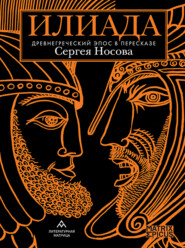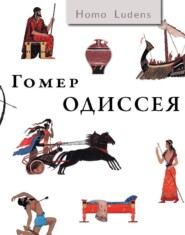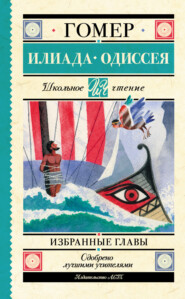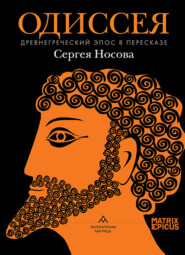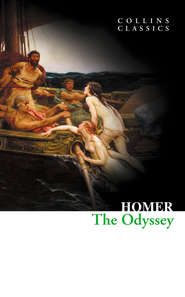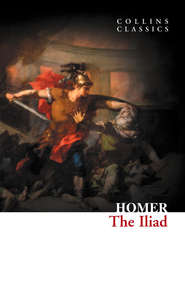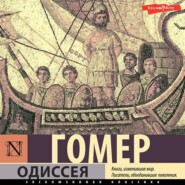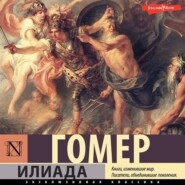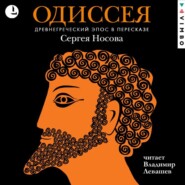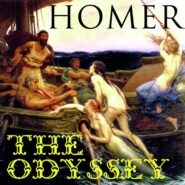По всем вопросам обращайтесь на: info@litportal.ru
(©) 2003-2024.
✖
The Odyssey of Homer, Done into English Prose
Настройки чтения
Размер шрифта
Высота строк
Поля
With that he gathered the clouds and troubled the waters of the deep, grasping his trident in his hands; and he roused all storms of all manner of winds, and shrouded in clouds the land and sea: and down sped night from heaven. The East Wind and the South Wind clashed, and the stormy West, and the North, that is born in the bright air, rolling onward a great wave. Then were the knees of Odysseus loosened and his heart melted, and heavily he spake to his own great spirit:
'Oh, wretched man that I am! what is to befal me at the last? I fear that indeed the goddess spake all things truly, who said that I should fill up the measure of sorrow on the deep, or ever I came to mine own country; and lo, all these things have an end. In such wise doth Zeus crown the wide heaven with clouds, and hath troubled the deep, and the blasts rush on of all the winds; yea, now is utter doom assured me. Thrice blessed those Danaans, yea, four times blessed, who perished on a time in wide Troy-land, doing a pleasure to the sons of Atreus! Would to God that I too had died, and met my fate on that day when the press of Trojans cast their bronze-shod spears upon me, fighting for the body of the son of Peleus! So should I have gotten my dues of burial, and the Achaeans would have spread my fame; but now it is my fate to be overtaken by a pitiful death.'
Even as he spake, the great wave smote down upon him, driving on in terrible wise, that the raft reeled again. And far therefrom he fell, and lost the helm from his hand; and the fierce blast of the jostling winds came and brake his mast in the midst, and sail and yard-arm fell afar into the deep. Long time the water kept him under, nor could he speedily rise from beneath the rush of the mighty wave: for the garments hung heavy which fair Calypso gave him. But late and at length he came up, and spat forth from his mouth the bitter salt water, which ran down in streams from his head. Yet even so forgat he not his raft, for all his wretched plight, but made a spring after it in the waves, and clutched it to him, and sat in the midst thereof, avoiding the issues of death; and the great wave swept it hither and thither along the stream. And as the North Wind in the harvest tide sweeps the thistle-down along the plain, and close the tufts cling each to other, even so the winds bare the raft hither and thither along the main. Now the South would toss it to the North to carry, and now again the East would yield it to the West to chase.
But the daughter of Cadmus marked him, Ino of the fair ankles, Leucothea, who in time past was a maiden of mortal speech, but now in the depths of the salt sea she had gotten her share of worship from the gods. She took pity on Odysseus in his wandering and travail, and she rose, like a sea-gull on the wing, from the depth of the mere, and sat upon the well-bound raft and spake saying:
'Hapless one, wherefore was Poseidon, shaker of the earth, so wondrous wroth with thee, seeing that he soweth for thee the seeds of many evils? Yet shall he not make a full end of thee, for all his desire. But do even as I tell thee, and methinks thou art not witless. Cast off these garments, and leave the raft to drift before the winds, but do thou swim with thine hands and strive to win a footing on the coast[12 - Lit. Strive after an arrival on the land, etc. [Greek] originally meant going, journeying, and had no idea of return. The earlier use survives here, and in Soph. Philoct. 43, Eur. Iph. Aul. 1261. Similarly, perhaps, [Greek] in Odyssey iv.619, xv.119, and [Greek] frequently] of the Phaeacians, where it is decreed that thou escape. Here, take this veil imperishable and wind it about thy breast; so is there no fear that thou suffer aught or perish. But when thou hast laid hold of the mainland with thy hands, loose it from off thee and cast it into the wine-dark deep far from the land, and thyself turn away.'
With that the goddess gave the veil, and for her part dived back into the heaving deep, like a sea-gull: and the dark wave closed over her. But the steadfast goodly Odysseus pondered, and heavily he spake to his own brave spirit:
'Ah, woe is me! Can it be that some one of the immortals is weaving a new snare for me, that she bids me quit my raft? Nay verily, I will not yet obey, for I had sight of the shore yet a long way off, where she told me that I might escape. I am resolved what I will do; – and methinks on this wise it is best. So long as the timbers abide in the dowels, so long will I endure steadfast in affliction, but so soon as the wave hath shattered my raft asunder, I will swim, for meanwhile no better counsel may be.'
While yet he pondered these things in his heart and soul, Poseidon, shaker of the earth, stirred against him a great wave, terrible and grievous, and vaulted from the crest, and therewith smote him. And as when a great tempestuous wind tosseth a heap of parched husks, and scatters them this way and that, even so did the wave scatter the long beams of the raft. But Odysseus bestrode a single beam, as one rideth on a courser, and stript him of the garments which fair Calypso gave him. And presently he wound the veil beneath his breast, and fell prone into the sea, outstretching his hands as one eager to swim. And the lord, the shaker of the earth, saw him and shook his head, and communed with his own soul. 'Even so, after all thy sufferings, go wandering over the deep, till thou shalt come among a people, the fosterlings of Zeus. Yet for all that I deem not that thou shalt think thyself too lightly afflicted.' Therewith he lashed his steeds of the flowing manes, and came to Aegae, where is his lordly home.
But Athene, daughter of Zeus, turned to new thoughts. Behold, she bound up the courses of the other winds, and charged them all to cease and be still; but she roused the swift North and brake the waves before him, that so Odysseus, of the seed of Zeus, might mingle with the Phaeacians, lovers of the oar, avoiding death and the fates.
So for two nights and two days he was wandering in the swell of the sea, and much his heart boded of death. But when at last the fair-tressed Dawn brought the full light of the third day, thereafter the breeze fell, and lo, there was a breathless calm, and with a quick glance ahead, (he being upborne on a great wave,) he saw the land very near. And even as when most welcome to his children is the sight of a father's life, who lies in sickness and strong pains long wasting away, some angry god assailing him; and to their delight the gods have loosed him from his trouble; so welcome to Odysseus showed land and wood; and he swam onward being eager to set foot on the strand. But when he was within earshot of the shore, and heard now the thunder of the sea against the reefs – for the great wave crashed against the dry land belching in terrible wise, and all was covered with foam of the sea, – for there were no harbours for ships nor shelters, but jutting headlands and reefs and cliffs; then at last the knees of Odysseus were loosened and his heart melted, and in heaviness he spake to his own brave spirit:
'Ah me! now that beyond all hope Zeus hath given me sight of land, and withal I have cloven my way through this gulf of the sea, here there is no place to land on from out of the grey water. For without are sharp crags, and round them the wave roars surging, and sheer the smooth rock rises, and the sea is deep thereby, so that in no wise may I find firm foothold and escape my bane, for as I fain would go ashore, the great wave may haply snatch and dash me on the jagged rock – and a wretched endeavour that would be. But if I swim yet further along the coast to find, if I may, spits that take the waves aslant and havens of the sea, I fear lest the storm-winds catch me again and bear me over the teeming deep, making heavy moan; or else some god may even send forth against me a monster from out of the shore water; and many such pastureth the renowned Amphitrite. For I know how wroth against me hath been the great Shaker of the Earth.'
Whilst yet he pondered these things in his heart and mind, a great wave bore him to the rugged shore. There would he have been stript of his skin and all his bones been broken, but that the goddess, grey-eyed Athene, put a thought into his heart. He rushed in, and with both his hands clutched the rock, whereto he clung till the great wave went by. So he escaped that peril, but again with backward wash it leapt on him and smote him and cast him forth into the deep. And as when the cuttlefish is dragged forth from his chamber, the many pebbles clinging to his suckers, even so was the skin stript from his strong hand against the rocks, and the great wave closed over him. There of a truth would luckless Odysseus have perished beyond that which was ordained, had not grey-eyed Athene given him sure counsel. He rose from the line of the breakers that belch upon the shore, and swam outside, ever looking landwards, to find, if he might, spits that take the waves aslant, and havens of the sea. But when he came in his swimming over against the mouth of a fair-flowing river, whereby the place seemed best in his eyes, smooth of rocks, and withal there was a covert from the wind, Odysseus felt the river running, and prayed to him in his heart:
'Hear me, O king, whosoever thou art; unto thee am I come, as to one to whom prayer is made, while I flee the rebukes of Poseidon from the deep. Yea, reverend even to the deathless gods is that man who comes as a wanderer, even as I now have come to thy stream and to thy knees after much travail. Nay pity me, O king; for I avow myself thy suppliant.'
So spake he, and the god straightway stayed his stream and withheld his waves, and made the water smooth before him, and brought him safely to the mouths of the river. And his knees bowed and his stout hands fell, for his heart was broken by the brine. And his flesh was all swollen and a great stream of sea water gushed up through his mouth and nostrils. So he lay without breath or speech, swooning, such terrible weariness came upon him. But when now his breath returned and his spirit came to him again, he loosed from off him the veil of the goddess, and let it fall into the salt flowing river. And the great wave bare it back down the stream, and lightly Ino caught it in her hands. Then Odysseus turned from the river, and fell back in the reeds, and kissed earth, the grain-giver, and heavily he spake unto his own brave spirit:
'Ah, woe is me! What is to betide me? What shall happen unto me at the last? If I watch the river bed all through the careful night, I fear that the bitter frost and fresh dew may overcome me, as I breathe forth my life for faintness, for the river breeze blows cold betimes in the morning. But if I climb the hill-side up to the shady wood, and there take rest in the thickets, though perchance the cold and weariness leave hold of me, and sweet sleep may come over me, I fear lest of wild beasts I become the spoil and prey.'
So as he thought thereon this seemed to him the better way. He went up to the wood, and found it nigh the water in a place of wide prospect. So he crept beneath twin bushes that grew from one stem, both olive trees, one of them wild olive. Through these the force of the wet winds blew never, neither did the bright sun light on it with his rays, nor could the rain pierce through, so close were they twined either to other; and thereunder crept Odysseus and anon he heaped together with his hands a broad couch; for of fallen leaves there was great plenty, enough to cover two or three men in winter time, however hard the weather. And the steadfast goodly Odysseus beheld it and rejoiced, and he laid him in the midst thereof and flung over him the fallen leaves. And as when a man hath hidden away a brand in the black embers at an upland farm, one that hath no neighbours nigh, and so saveth the seed of fire, that he may not have to seek a light otherwhere, even so did Odysseus cover him with the leaves. And Athene shed sleep upon his eyes, that so it might soon release him from his weary travail, overshadowing his eyelids.
Book VI
Nausicaa, going to a river near that place to wash the clothes of her father, mother, and brethren, while the clothes were drying played with her maids at ball; and Odysseus coming forth is fed and clothed, and led on his way to the house of her father, King Alcinous.
So there he lay asleep, the steadfast goodly Odysseus, fordone with toil and drowsiness. Meanwhile Athene went to the land and the city of the Phaeacians, who of old, upon a time, dwelt in spacious Hypereia; near the Cyclopes they dwelt, men exceeding proud, who harried them continually, being mightier than they. Thence the godlike Nausithous made them depart, and he carried them away, and planted them in Scheria, far off from men that live by bread. And he drew a wall around the town, and builded houses and made temples for the gods and meted out the fields. Howbeit ere this had he been stricken by fate, and had gone down to the house of Hades, and now Alcinous was reigning, with wisdom granted by the gods. To his house went the goddess, grey-eyed Athene, devising a return for the great-hearted Odysseus. She betook her to the rich-wrought bower, wherein was sleeping a maiden like to the gods in form and comeliness, Nausicaa, the daughter of Alcinous, high of heart. Beside her on either hand of the pillars of the door were two handmaids, dowered with beauty from the Graces, and the shining doors were shut.
But the goddess, fleet as the breath of the wind, swept towards the couch of the maiden, and stood above her head, and spake to her in the semblance of the daughter of a famous seafarer, Dymas, a girl of like age with Nausicaa, who had found grace in her sight. In her shape the grey-eyed Athene spake to the princess, saying:
'Nausicaa, how hath thy mother so heedless a maiden to her daughter? Lo, thou hast shining raiment that lies by thee uncared for, and thy marriage day is near at hand, when thou thyself must needs go beautifully clad, and have garments to give to them who shall lead thee to the house of the bridegroom! And, behold, these are the things whence a good report goes abroad among men, wherein a father and lady mother take delight. But come, let us arise and go a-washing with the breaking of the day, and I will follow with thee to be thy mate in the toil, that without delay thou mayst get thee ready, since truly thou art not long to be a maiden. Lo, already they are wooing thee, the noblest youths of all the Phaeacians, among that people whence thou thyself dost draw thy lineage. So come, beseech thy noble father betimes in the morning to furnish thee with mules and a wain to carry the men's raiment, and the robes, and the shining coverlets. Yea and for thyself it is seemlier far to go thus than on foot, for the places where we must wash are a great way off the town.'
So spake the grey-eyed Athene, and departed to Olympus, where, as they say, is the seat of the gods that standeth fast for ever. Not by winds is it shaken, nor ever wet with rain, nor doth the snow come nigh thereto, but most clear air is spread about it cloudless, and the white light floats over it. Therein the blessed gods are glad for all their days, and thither Athene went when she had shown forth all to the maiden.
Anon came the throned Dawn, and awakened Nausicaa of the fair robes, who straightway marvelled on the dream, and went through the halls to tell her parents, her father dear and her mother. And she found them within, her mother sitting by the hearth with the women her handmaids, spinning yarn of sea-purple stain, but her father she met as he was going forth to the renowned kings in their council, whither the noble Phaeacians called him. Standing close by her dear father she spake, saying: 'Father, dear, couldst thou not lend me a high waggon with strong wheels, that I may take the goodly raiment to the river to wash, so much as I have lying soiled? Yea and it is seemly that thou thyself, when thou art with the princes in council, shouldest have fresh raiment to wear. Also, there are five dear sons of thine in the halls, two married, but three are lusty bachelors, and these are always eager for new-washen garments wherein to go to the dances; for all these things have I taken thought.'
This she said, because she was ashamed to speak of glad marriage to her father; but he saw all and answered, saying:
'Neither the mules nor aught else do I grudge thee, my child. Go thy ways, and the thralls shall get thee ready a high waggon with good wheels, and fitted with an upper frame.'
Therewith he called to his men, and they gave ear, and without the palace they made ready the smooth-running mule-wain, and led the mules beneath the yoke, and harnessed them under the car, while the maiden brought forth from her bower the shining raiment. This she stored in the polished car, and her mother filled a basket with all manner of food to the heart's desire, dainties too she set therein, and she poured wine into a goat-skin bottle, while Nausicaa climbed into the wain. And her mother gave her soft olive oil also in a golden cruse, that she and her maidens might anoint themselves after the bath. Then Nausicaa took the whip and the shining reins, and touched the mules to start them; then there was a clatter of hoofs, and on they strained without flagging, with their load of the raiment and the maiden. Not alone did she go, for her attendants followed with her.
Now when they were come to the beautiful stream of the river, where truly were the unfailing cisterns, and bright water welled up free from beneath, and flowed past, enough to wash the foulest garments clean, there the girls unharnessed the mules from under the chariot, and turning them loose they drove them along the banks of the eddying river to graze on the honey-sweet clover. Then they took the garments from the wain, in their hands, and bore them to the black water, and briskly trod them down in the trenches, in busy rivalry. Now when they had washed and cleansed all the stains, they spread all out in order along the shore of the deep, even where the sea, in beating on the coast, washed the pebbles clean. Then having bathed and anointed them well with olive oil, they took their mid-day meal on the river's banks, waiting till the clothes should dry in the brightness of the sun. Anon, when they were satisfied with food, the maidens and the princess, they fell to playing at ball, casting away their tires, and among them Nausicaa of the white arms began the song. And even as Artemis, the archer, moveth down the mountain, either along the ridges of lofty Taygetus or Erymanthus, taking her pastime in the chase of boars and swift deer, and with her the wild wood-nymphs disport them, the daughters of Zeus, lord of the aegis, and Leto is glad at heart, while high over all she rears her head and brows, and easily may she be known, – but all are fair; even so the girl unwed outshone her maiden company.
But when now she was about going homewards, after yoking the mules and folding up the goodly raiment, then grey-eyed Athene turned to other thoughts, that so Odysseus might awake, and see the lovely maiden, who should be his guide to the city of the Phaeacian men. So then the princess threw the ball at one of her company; she missed the girl, and cast the ball into the deep eddying current, whereat they all raised a piercing cry. Then the goodly Odysseus awoke and sat up, pondering in his heart and spirit:
'Woe is me! to what men's land am I come now? say, are they froward, and wild, and unjust, or are they hospitable, and of God-fearing mind? How shrill a cry of maidens rings round me, of the nymphs that hold the steep hill-tops, and the river-springs, and the grassy water meadows! It must be, methinks, that I am near men of human speech. Go to, I myself will make trial and see.'
Therewith the goodly Odysseus crept out from under the coppice, having broken with his strong hand a leafy bough from the thick wood, to hold athwart his body, that it might hide his nakedness withal. And forth he sallied like a lion mountain-bred, trusting in his strength, who fares out blown and rained upon, with flaming eyes; amid the kine he goes or amid the sheep or in the track of the wild deer; yea, his belly bids him go even to the good homestead to make assay upon the flocks. Even so Odysseus was fain to draw nigh to the fair-tressed maidens, all naked as he was, such need had come upon him. But he was terrible in their eyes, being marred with the salt sea foam, and they fled cowering here and there about the jutting spits of shore. And the daughter of Alcinous alone stood firm, for Athene gave her courage of heart, and took all trembling from her limbs. So she halted and stood over against him, and Odysseus considered whether he should clasp the knees of the lovely maiden, and so make his prayer, or should stand as he was, apart, and beseech her with smooth words, if haply she might show him the town, and give him raiment. And as he thought within himself, it seemed better to stand apart, and beseech her with smooth words, lest the maiden should be angered with him if he touched her knees: so straightway he spake a sweet and cunning word:
'I supplicate thee, O queen, whether thou art a goddess or a mortal! If indeed thou art a goddess of them that keep the wide heaven; to Artemis, then, the daughter of great Zeus, I mainly liken thee, for beauty and stature and shapeliness. But if thou art one of the daughters of men who dwell on earth, thrice blessed are thy father and thy lady mother, and thrice blessed thy brethren. Surely their souls ever glow with gladness for thy sake, each time they see thee entering the dance, so fair a flower of maidens. But he is of heart the most blessed beyond all other who shall prevail with gifts of wooing, and lead thee to his home. Never have mine eyes beheld such an one among mortals, neither man nor woman; great awe comes upon me as I look on thee. Yet in Delos once I saw as goodly a thing: a young sapling of a palm tree springing by the altar of Apollo. For thither too I went, and much people with me, on that path where my sore troubles were to be. Yea, and when I looked thereupon, long time I marvelled in spirit, – for never grew there yet so goodly a shoot from ground, – even in such wise as I wonder at thee, lady, and am astonied and do greatly fear to touch thy knees, though grievous sorrow is upon me. Yesterday, on the twentieth day, I escaped from the wine-dark deep, but all that time continually the wave bare me, and the vehement winds drave, from the isle Ogygia. And now some god has cast me on this shore, that here too, methinks, some evil may betide me; for I trow not that trouble will cease; the gods ere that time will yet bring many a thing to pass. But, queen, have pity on me, for after many trials and sore to thee first of all am I come, and of the other folk, who hold this city and land, I know no man. Nay show me the town, give me an old garment to cast about me, if thou hadst, when thou camest here, any wrap for the linen. And may the gods grant thee all thy heart's desire: a husband and a home, and a mind at one with his may they give – a good gift, for there is nothing mightier and nobler than when man and wife are of one heart and mind in a house, a grief to their foes, and to their friends great joy, but their own hearts know it best.'
Then Nausicaa of the white arms answered him, and said: 'Stranger, forasmuch as thou seemest no evil man nor foolish – and it is Olympian Zeus himself that giveth weal to men, to the good and to the evil, to each one as he will, and this thy lot doubtless is of him, and so thou must in anywise endure it: – and now, since thou hast come to our city and our land, thou shalt not lack raiment, nor aught else that is the due of a hapless suppliant, when he has met them who can befriend him. And I will show thee the town, and name the name of the people. The Phaeacians hold this city and land, and I am the daughter of Alcinous, great of heart, on whom all the might and force of the Phaeacians depend.'
Thus she spake, and called to her maidens of the fair tresses: 'Halt, my maidens, whither flee ye at the sight of a man? Ye surely do not take him for an enemy? That mortal breathes not, and never will be born, who shall come with war to the land of the Phaeacians, for they are very dear to the gods. Far apart we live in the wash of the waves, the outermost of men, and no other mortals are conversant with us. Nay, but this man is some helpless one come hither in his wanderings, whom now we must kindly entreat, for all strangers and beggars are from Zeus, and a little gift is dear. So, my maidens, give the stranger meat and drink, and bathe him in the river, where withal is a shelter from the winds.'
So she spake, but they had halted and called each to the other, and they brought Odysseus to the sheltered place, and made him sit down, as Nausicaa bade them, the daughter of Alcinous, high of heart. Beside him they laid a mantle, and a doublet for raiment, and gave him soft olive oil in the golden cruse, and bade him wash in the streams of the river. Then goodly Odysseus spake among the maidens, saying: 'I pray you stand thus apart, while I myself wash the brine from my shoulders, and anoint me with olive oil, for truly oil is long a stranger to my skin. But in your sight I will not bathe, for I am ashamed to make me naked in the company of fair-tressed maidens.'
Then they went apart and told all to their lady. But with the river water the goodly Odysseus washed from his skin the salt scurf that covered his back and broad shoulders, and from his head he wiped the crusted brine of the barren sea. But when he had washed his whole body, and anointed him with olive oil, and had clad himself in the raiment that the unwedded maiden gave him, then Athene, the daughter of Zeus, made him greater and more mighty to behold, and from his head caused deep curling locks to flow, like the hyacinth flower. And as when some skilful man overlays gold upon silver – one that Hephaestus and Pallas Athene have taught all manner of craft, and full of grace is his handiwork – even so did Athene shed grace about his head and shoulders.
Then to the shore of the sea went Odysseus apart, and sat down, glowing in beauty and grace, and the princess marvelled at him, and spake among her fair-tressed maidens, saying:
'Listen, my white-armed maidens, and I will say somewhat. Not without the will of all the gods who hold Olympus hath this man come among the godlike Phaeacians. Erewhile he seemed to me uncomely, but now he is like the gods that keep the wide heaven. Would that such an one might be called my husband, dwelling here, and that it might please him here to abide! But come, my maidens, give the stranger meat and drink.'
Thus she spake, and they gave ready ear and hearkened, and set beside Odysseus meat and drink, and the steadfast goodly Odysseus did eat and drink eagerly, for it was long since he had tasted food.
Now Nausicaa of the white arms had another thought. She folded the raiment and stored it in the goodly wain, and yoked the mules strong of hoof, and herself climbed into the car. Then she called on Odysseus, and spake and hailed him: 'Up now, stranger, and rouse thee to go to the city, that I may convey thee to the house of my wise father, where, I promise thee, thou shalt get knowledge of all the noblest of the Phaeacians. But do thou even as I tell thee, and thou seemest a discreet man enough. So long as we are passing along the fields and farms of men, do thou fare quickly with the maidens behind the mules and the chariot, and I will lead the way. But when we set foot within the city, – whereby goes a high wall with towers, and there is a fair haven on either side of the town, and narrow is the entrance, and curved ships are drawn up on either hand of the mole, for all the folk have stations for their vessels, each man one for himself. And there is the place of assembly about the goodly temple of Poseidon, furnished with heavy stones, deep bedded in the earth. There men look to the gear of the black ships, hawsers and sails, and there they fine down the oars. For the Phaeacians care not for bow nor quiver, but for masts, and oars of ships, and gallant barques, wherein rejoicing they cross the grey sea. Their ungracious speech it is that I would avoid, lest some man afterward rebuke me, and there are but too many insolent folk among the people. And some one of the baser sort might meet me and say: "Who is this that goes with Nausicaa, this tall and goodly stranger? Where found she him? Her husband he will be, her very own. Either she has taken in some shipwrecked wanderer of strange men, – for no men dwell near us; or some god has come in answer to her instant prayer; from heaven has he descended, and will have her to wife for evermore. Better so, if herself she has ranged abroad and found a lord from a strange land, for verily she holds in no regard the Phaeacians here in this country, the many men and noble who are her wooers." So will they speak, and this would turn to my reproach. Yea, and I myself would think it blame of another maiden who did such things in despite of her friends, her father and mother being still alive, and was conversant with men before the day of open wedlock. But, stranger, heed well what I say, that as soon as may be thou mayest gain at my father's hands an escort and a safe return. Thou shalt find a fair grove of Athene, a poplar grove near the road, and a spring wells forth therein, and a meadow lies all around. There is my father's demesne, and his fruitful close, within the sound of a man's shout from the city. Sit thee down there and wait until such time as we may have come into the city, and reached the house of my father. But when thou deemest that we are got to the palace, then go up to the city of the Phaeacians, and ask for the house of my father Alcinous, high of heart. It is easily known, and a young child could be thy guide, for nowise like it are builded the houses of the Phaeacians, so goodly is the palace of the hero Alcinous. But when thou art within the shadow of the halls and the court, pass quickly through the great chamber, till thou comest to my mother, who sits at the hearth in the light of the fire, weaving yarn of sea-purple stain, a wonder to behold. Her chair is leaned against a pillar, and her maidens sit behind her. And there my father's throne leans close to hers, wherein he sits and drinks his wine, like an immortal. Pass thou by him, and cast thy hands about my mother's knees, that thou mayest see quickly and with joy the day of thy returning, even if thou art from a very far country. If but her heart be kindly disposed toward thee, then is there hope that thou shalt see thy friends, and come to thy well-builded house, and to thine own country.'
She spake, and smote the mules with the shining whip, and quickly they left behind them the streams of the river. And well they trotted and well they paced, and she took heed to drive in such wise that the maidens and Odysseus might follow on foot, and cunningly she plied the lash. Then the sun set, and they came to the famous grove, the sacred place of Athene; so there the goodly Odysseus sat him down. Then straightway he prayed to the daughter of mighty Zeus: 'Listen to me, child of Zeus, lord of the aegis, unwearied maiden; hear me even now, since before thou heardest not when I was smitten on the sea, when the renowned Earth-shaker smote me. Grant me to come to the Phaeacians as one dear, and worthy of pity.'
So he spake in prayer, and Pallas Athene heard him; but she did not yet appear to him face to face, for she had regard unto her father's brother, who furiously raged against the godlike Odysseus, till he should come to his own country.
Book VII
Odysseus being received at the house of the king Alcinous, the queen after supper, taking notice of his garments, gives him occasion to relate his passage thither on the raft. Alcinous promises him a convoy for the morrow.
So he prayed there, the steadfast goodly Odysseus, while the two strong mules bare the princess to the town. And when she had now come to the famous palace of her father, she halted at the gateway, and round her gathered her brothers, men like to the immortals, and they loosed the mules from under the car, and carried the raiment within. But the maiden betook her to her chamber; and an aged dame from Aperaea kindled the fire for her, Eurymedusa, the handmaid of the chamber, whom the curved ships upon a time had brought from Aperaea; and men chose her as a prize for Alcinous, seeing that he bare rule over all the Phaeacians, and the people hearkened to him as to a god. She waited on the white-armed Nausicaa in the palace halls; she was wont to kindle the fire and prepare the supper in the inner chamber.
At that same hour Odysseus roused him to go to the city, and Athene shed a deep mist about Odysseus for the favour that she bare him, lest any of the Phaeacians, high of heart, should meet him and mock him in sharp speech, and ask him who he was. But when he was now about to enter the pleasant city, then the goddess, grey-eyed Athene, met him, in the fashion of a young maiden carrying a pitcher, and she stood over against him, and goodly Odysseus inquired of her:
'My child, couldst thou not lead me to the palace of the lord Alcinous, who bears sway among this people? Lo, I am come here, a stranger travel-worn from afar, from a distant land; wherefore of the folk who possess this city and country I know not any man.'
Then the goddess, grey-eyed Athene, answered him saying: 'Yea now, father and stranger, I will show thee the house that thou bidst me declare, for it lies near the palace of my noble father; behold, be silent as thou goest, and I will lead the way. And look on no man, nor question any. For these men do not gladly suffer strangers, nor lovingly entreat whoso cometh from a strange land. They trust to the speed of their swift ships, wherewith they cross the great gulf, for the Earth-shaker hath vouchsafed them this power. Their ships are swift as the flight of a bird, or as a thought.'
Therewith Pallas Athene led the way swiftly, and he followed hard in the footsteps of the goddess. And it came to pass that the Phaeacians, mariners renowned, marked him not as he went down the city through their midst, for the fair tressed Athene suffered it not, that awful goddess, who shed a wondrous mist about him, for the favour that she bare him in her heart. And Odysseus marvelled at the havens and the gallant ships, yea and the places of assembly of the heroes, and the long high walls crowned with palisades, a marvel to behold. But when they had now come to the famous palace of the king, the goddess, grey-eyed Athene, spake first and said:
'Lo, here, father and stranger, is the house that thou wouldst have me show thee: and thou shalt find kings at the feast, the fosterlings of Zeus; enter then, and fear not in thine heart, for the dauntless man is the best in every adventure, even though he come from a strange land. Thou shalt find the queen first in the halls; Arete is the name whereby men call her, and she came even of those that begat the king Alcinous. First Nausithous was son of Poseidon, the Earth-shaker, and of Periboea, the comeliest of women, youngest daughter of great-hearted Eurymedon, who once was king among the haughty Giants. Howbeit, he destroyed his infatuate people, and was himself destroyed; but Poseidon lay with Periboea and begat a son, proud Nausithous, who sometime was prince among the Phaeacians; and Nausithous begat Rhexenor and Alcinous. While Rhexenor had as yet no son, Apollo of the silver bow smote him, a groom new wed, leaving in his halls one only child Arete; and Alcinous took her to wife, and honoured her as no other woman in the world is honoured, of all that now-a-days keep house under the hand of their lords. Thus she hath, and hath ever had, all worship heartily from her dear children and from her lord Alcinous and from all the folk, who look on her as on a goddess, and greet her with reverend speech, when she goes about the town. Yea, for she too hath no lack of understanding. To whomso she shows favour, even if they be men, she ends their feuds.[13 - And for the women she favours, she ends the feuds of their lords also.] If but her heart be kindly disposed to thee, then is there good hope that thou mayest see thy friends, and come to thy high-roofed home and thine own country.'
Therewith grey-eyed Athene departed over the unharvested seas, and left pleasant Scheria, and came to Marathon and wide-wayed Athens, and entered the good house of Erechtheus. Meanwhile Odysseus went to the famous palace of Alcinous, and his heart was full of many thoughts as he stood there or ever he had reached the threshold of bronze. For there was a gleam as it were of sun or moon through the high-roofed hall of great-hearted Alcinous. Brazen were the walls which ran this way and that from the threshold to the inmost chamber, and round them was a frieze of blue, and golden were the doors that closed in the good house. Silver were the door-posts that were set on the brazen threshold, and silver the lintel thereupon, and the hook of the door was of gold. And on either side stood golden hounds and silver, which Hephaestus wrought by his cunning, to guard the palace of great-hearted Alcinous, being free from death and age all their days. And within were seats arrayed against the wall this way and that, from the threshold even to the inmost chamber, and thereon were spread light coverings finely woven, the handiwork of women. There the Phaeacian chieftains were wont to sit eating and drinking, for they had continual store. Yea, and there were youths fashioned in gold, standing on firm-set bases, with flaming torches in their hands, giving light through the night to the feasters in the palace. And he had fifty handmaids in the house, and some grind the yellow grain on the millstone, and others weave webs and turn the yarn as they sit, restless as the leaves of the tall poplar tree: and the soft olive oil drops off that linen, so closely is it woven. For as the Phaeacian men are skilled beyond all others in driving a swift ship upon the deep, even so are the women the most cunning at the loom, for Athene hath given them notable wisdom in all fair handiwork and cunning wit. And without the courtyard hard by the door is a great garden, off our ploughgates, and a hedge runs round on either side. And there grow tall trees blossoming, pear-trees and pomegranates, and apple-trees with bright fruit, and sweet figs, and olives in their bloom. The fruit of these trees never perisheth neither faileth, winter nor summer, enduring through all the year. Evermore the West Wind blowing brings some fruits to birth and ripens others. Pear upon pear waxes old, and apple on apple, yea and cluster ripens upon cluster of the grape, and fig upon fig. There too hath he a fruitful vineyard planted, whereof the one part is being dried by the heat, a sunny plot on level ground, while other grapes men are gathering, and yet others they are treading in the wine-press. In the foremost row are unripe grapes that cast the blossom, and others there be that are growing black to vintaging. There too, skirting the furthest line, are all manner of garden beds, planted trimly, that are perpetually fresh, and therein are two fountains of water, whereof one scatters his streams all about the garden, and the other runs over against it beneath the threshold of the courtyard, and issues by the lofty house, and thence did the townsfolk draw water. These were the splendid gifts of the gods in the palace of Alcinous.






